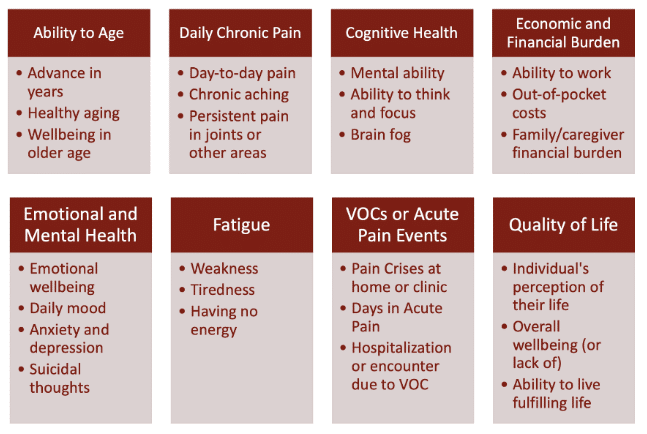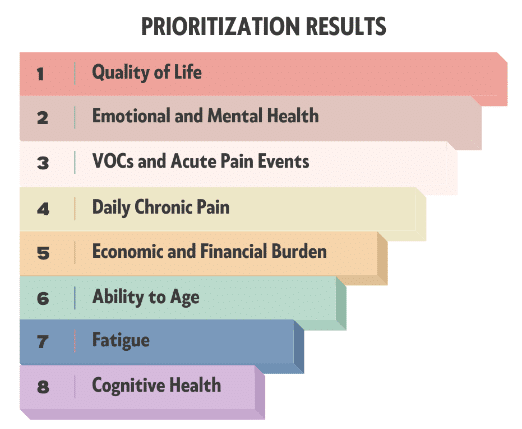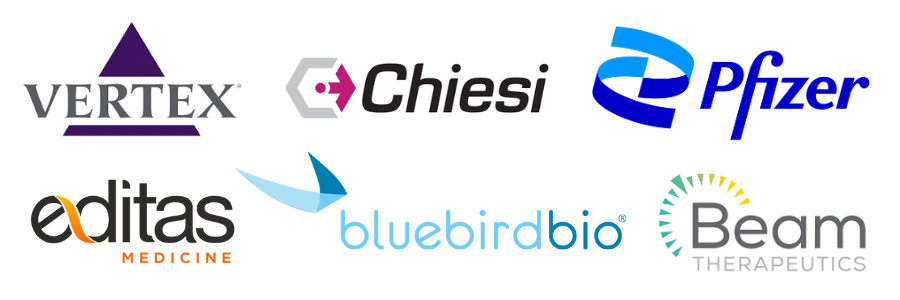What matters most to SCD Warriors?
As more treatments become available for SCD warriors, there is limited data on the value of these treatments for patients. Having a complete understanding of what matters most to patients and stakeholders is essential to improving the health and well-being of SCD warriors. Knowing what values SCD warriors prioritize can better shape SCD research, which in turn improves healthcare decision-making for the SCD community.
To get to the bottom of what core values should be incorporated into SCD research goals, Sick Cells has been in collaboration with the University of Southern California Hematology Utilization Group Studies (USC HUGS) and the Comparative Health Outcomes, Policy, and Economics (CHOICE) Institute at University of Washington School of Pharmacy. The organizations hosted two roundtables where stakeholders discussed and ranked disease impacts on the SCD community.
This blog will present the results of this research to highlight what matters most to SCD warriors and the community. This blog will also describe the importance of patient-reported outcomes and how they should be incorporated into SCD research.
Important Terms to Know
The project focuses on the importance of Patient-reported outcomes (PROs), which according to the FDA’s definition, is the “measure of a patient’s health status as reported directly from the patient without added interpretation by a healthcare worker or anyone else, such as a pain scale.” Patient-reported outcomes, or PROs, are important because a patient is a person who is most aware of how they feel. In certain clinical measurements or academic studies, what matters most to the patient might not always be captured or reported. Highlighting PROs ensures that SCD warrior voices are heard in SCD research.
Spotlighting PROs is one of the many ways that Sick Cells aims to achieve health equity, which the CDC defines as “the state in which everyone has a fair and just opportunity to attain their highest level of health.” Achieving health equity also means valuing everyone and identifying and eliminating health disparities. These disparities can only be identified if the healthcare community hears directly from SCD warriors.
This project, conducted by Sick Cells, was funded through a PCORI engagement award in 2022. The Patient-Centered Outcomes Research Institute (PCORI), is an independent, nonprofit research organization that seeks to empower patients and others with actionable information about their health and healthcare choices.
Roundtables Determine Priorities in SCD Communities
The project began on June 1, 2022, and was led by a steering committee and a community advisory board. The steering committee was comprised of a diverse group of stakeholders that created agenda items, planned discussions and met on a monthly basis. The community advisory board (CAB) included non-profit leaders from the SCD community who served as community experts that met a total of five times throughout the duration of the project.
Over the course of the project, there were two Roundtable discussions. The topics of these roundtables were how SCD can have different outcomes among individuals and their families. The discussions also served as a community engagement tool to build more partnerships and assess barriers in healthcare.
The first Roundtable discussion occurred on November 16, 2022, and the objective was to talk through important disease impacts and PROs according to patients and community stakeholders. There were a total of 50 participants: four SCD advocates, seven caregivers, seventeen individuals from a government agency/industry, nine researchers, and thirteen SCD warriors. Eight disease impacts were identified as being important to the SCD community. These are the ability to age, daily chronic pain, cognitive health, economic and financial burden, emotional and mental health, fatigue, VOCs or acute pain events, and quality of life.
Definitions of Important Disease Impacts for Sickle Cell Disease

The second Roundtable discussion happened on March 30, 2023. The objective of this roundtable was to rank the eight disease impacts discussed in the first roundtable. The ranking determined which disease impacts are most important to the SCD community and stakeholders. This Roundtable had 42 participants, including patients, caregivers, and stakeholders. From this ranking and weighting exercise, quality of life was ranked as the number one priority for SCD warriors, followed by emotional and mental health, VOCs, and acute pain events treated at home and in the hospital.

The outcomes of these two roundtables are meant to pave the foundation for conversations around improving assessments of treatments for SCD warriors. They also inform researchers on what direction SCD research should take in the future. The long-term goal of this project is to guarantee future research efforts will reflect the concerns and priorities of the SCD community.
The results of this research will be published in peer-reviewed journals and social media posts and be adapted into patient-reported outcome measurement tools to be more equitable for researchers and clinicians. For now, researchers have a helpful guide of what disease impacts are most important to SCD warriors. As the top-ranked disease impact, “quality of life” definitely needs more attention, and stakeholders and government agencies should continue conversations around what quality of life means to SCD warriors.
Improving Health Equity, One Study at a Time
This project was a step in improving health equity in SCD research by creating a climate for warriors to feel an improvement in fair inclusion in research and healthcare. Improving care for SCD warriors starts with knowing what SCD warriors care about. The results of the two roundtable discussions provide a great outline of what should be prioritized in SCD research and can hopefully help close research gaps.
Stay Connected!
Continue to engage with Sick Cells for more information on future research projects and opportunities for community engagement.
Published June 2023
